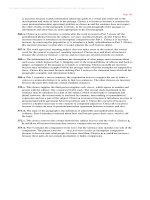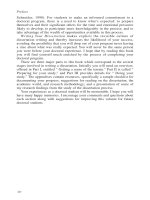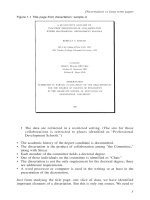Writing your doctoral dissertation - part 16 doc
Bạn đang xem bản rút gọn của tài liệu. Xem và tải ngay bản đầy đủ của tài liệu tại đây (48.37 KB, 5 trang )
Creating a professional setting
72
Doctoral students need a variety of groups, from formal seminars to
informal lunch groups. …Three sources of support are necessary and
vital: an adviser who makes you stretch, a group of faculty and students
who discuss research and challenge one another, and an informal group
that can solve an individual’s particular problem through their shared
candor, insightfulness, irreverence, humor, or any combination. The
writing of the dissertation isn’t a time for being alone and writing in a
closed room; it should be a time to nurture, invest in, and benefit from
the collegial friendships begun in course work that will continue
throughout our professional careers.
(Gilles, 1996, p. 52)
There is another compelling reason for advancing the need to seek out
colleagues. Part of your goal in getting the degree is to enter a new
community. Now is the time to start building that community.
You cannot do this alone. You will need to allow yourself to say that you
“don’t know,” and along with that, you need to find ways to become more
knowledgeable. The companionship of others struggling with similar
concerns is mutually supportive. And the struggles which you survive today
will become the core of the humorous lore you repeat as your group
progresses professionally.
Your experiences working with colleagues on your dissertation will carry
over into other professional activities. Our professional work is frequently
the product of collaboration: setting up a conference program, searching for
new faculty, planning a research project, and evaluating programs. The people
you worked with on your dissertation can become an important resource in
your professional life-after-dissertation if you learn to work well when you
are students together.
Frequently your student-colleagues are the only ones who truly understand
what you are going through. They know all of the professors and their
idiosyncrasies. They can sympathize with you when you are down; they will
take the time to help you to see the light at the end of the tunnel, and keep
you on track.
In addition to the emotional support offered by your peers, there is
academic support as well. You promote each other’s learning through talking
about what you are doing. Your professional conversations offer you a
comfortable setting for trying out the new technical language and ideas which
predominate in your readings. Your small informal group(s) serve to bridge
your two worlds, helping you to become more comfortable with the
specialized language of your profession while conversing with supportive
neophytes. Student-colleagues are also an excellent source of information as
you search for potential committee members.
Some useful questions students pose to each other include:
• How do/did you work with Professor X?
• What are/were some good ways to get done?
Creating a professional setting
73
• What problems can I expect to encounter?
• What strategies are useful for me to adopt?
• How often did you get to talk with Professor X? Was that frequent enough?
• Did Professor X keep appointments?
• Did you need to confirm all appointments?
• Were the appointments at times which were convenient for you?
• Were there distractions during your appointment time?
• Does Professor X give useful comments to advance your work?
• Is Professor X supportive—or do you feel foolish with him or her?
• Did you feel that you were treated differently from other students?
• Did you feel that you needed to do work for Professor X (xeroxing, baby
sitting, or driving to the airport, etc.) in exchange for Professor X’s help?
• Did you teach, conduct research, and grade papers as part of your training
or in exchange for assistance on your dissertation?
• Did you have to agree to publish your dissertation with Professor X?
• Which professors get along?
• What problems might I expect?
• How do/did you negotiate problems?
Some students isolate themselves, believing groups are distractions. Without
these diversions, they believe they will finish more rapidly. They frequently
regret this decision, and eventually seek ways to become incorporated into
groups. Isolating yourself from the dissertation community leaves you
vulnerable to being forgotten by your peers and your program faculty. Those
students who get “lost,” either literally or figuratively, are most likely to drop
out. Ultimately, the issue is not to isolate yourself, nor allow yourself to be
isolated from students or faculty.
So what can you do? You can find on-going groups of students who will allow
you to join with them, or you can start a group. Usually some activity in your
program brings everyone together, such as the courses, candidacy experience, or
dissertation seminar. Students who form study groups benefit academically and
emotionally, meeting informally with these colleagues on a continuing basis.
The University Community
There are a wide variety of people who comprise your university community
beyond your committee and your student-colleagues. All can potentially
support your progress. We will consider a few such opportunities.
Libraries
Many contemporary researchers are doing virtually all of their library
research on computer terminals, perhaps miles from the place where these
materials are housed. While on the one hand I can admire the expertise, I am
Creating a professional setting
74
fearful of the possibility that when you are surfing the net, you may forgo
the serendipitous experiences that occur when browsing in the library.
Wandering among the stacks, we meet interesting people and we also spot titles
worthy of investigation—names which we’ve heard before but whose connection
with our own work we are not sure about and attractively bound works which
please our aesthetic senses. These accidental sightings may lead to uncharted,
exciting discoveries. It is advantageous to find bridges between disciplines, noting
overlap in some important realms, as a way to see the world through new lenses—
all part of the research process. When you look at articles in journals, look at the
whole journal. In addition to reading the article which was your initial goal, review
the table of contents, other articles in that issue, perhaps some book reviews, and
certainly the book advertisements and conference announcements. You need truly
to immerse yourself in your professional community, and journals are one easy
resource which invite your participation.
You will also find a valuable resource in a friendly librarian. Not only will
you get assistance in finding materials technologically, but you will also get
access to texts which may enable you to connect important disciplines, events,
or luminaries in your field. Librarians can also expedite your request for inter-
library loans, for computer searches, and for new library acquisitions. These
“information specialists” can facilitate your access to materials that draw on
their expertise. They can alert you to times when the library will be closed or
noisy construction work is scheduled. They also can tell you when a publication
which seems related to your research has arrived, or when they’ve come across
a new source of information which may be of interest to you.
As you wander in the library you will also meet compatriots, people who
are similarly engaged in research. You may strike up conversations with
people reading from the same journals as you are, becoming aware that
although they are affiliated with a different university department, they have
similar academic concerns. The opportunity for expanding your
understanding of your “discipline” and other, related disciplines may present
itself in this context. The university community is diverse in many ways, with
some core values which resonate across department boundaries. Your
engagement in library research may promote your understanding of that
culture.
Computer Technicians
The computer technicians are a crucial resource. Not only can they get you up
and running on current technology, they can apprise you of new software and
new equipment which might facilitate your work. In addition, you may succeed
in convincing them to order some hardware or software which might assist you.
If you use the computer facility on a regular basis, you will probably find
a space which is most comfortable for you. If you are friendly, you may find
that space “reserved” for you. On the other hand, you may find that your
equipment is frequently “down” or your software has been removed from the
Creating a professional setting
75
system. By being friendly to all, you will not only feel better about yourself,
but you are likely to make more rapid progress.
University Security
The security personnel in your school see everything. They see you come
and go. They know who your friends are and when you are glum. If you are
friendly to them, they may even become important supports: cheering you up
when you are down, telling your friends where to find you, and securing
materials you inadvertently leave behind. They will greet you after a holiday
break, and celebrate your progress in your program. If you let them into your
world, they somehow understand that what you are doing is not easy, and
they are happy for you as you move closer to your degree.
Personnel in Local Shops
The book store personnel can help you in many ways. For example, they may
locate books which are in your field, expand their list of offerings in your field,
expedite your request for materials, and tell you of recent releases which are in
areas of potential interest to you. The coffee-bar workers will allow you to sit for
hours, cleaning up your mess, and maintaining a comfortable climate, perhaps even
engaging in conversation with you about your work. Their questions may require
you to explain your ideas carefully and expansively. When you switch from the
specialized language in your professional journals you think more clearly about
what precisely you are studying and how it may be important to life in general.
Although financially they may be disappointed to see you graduate, they will
celebrate with you, and feel proud of their contribution to your progress.
Professional Conferences and Colleagues
A number of national and local professional conferences have encouraged
doctoral students in a variety of ways. Seek these out, soliciting recommendations
from your committee. The journals, which publish articles in your discipline are
typically connected with professional organizations which sponsor conferences.
The journals also carry advertisements of professional and university-based
conferences. When you join professional organizations your name is placed on
mailing lists to receive notices of conferences. You may also find it useful to
contact professors and students at other universities who are working “in your
field,” and to inquire from them about upcoming professional conferences.
Conferences are particularly useful for a number of reasons:
• Most of the people who attend these sessions seem to be supportive,
finding ways to help others.
Creating a professional setting
76
• These are annual, predictable settings where you can (if you wish) be
almost anonymous, listening to what others are going through, and
learning vicariously.
• Experts in the field who attend these sessions have been both insightful and
supportive, helping students in a variety of ways including such issues as:
• getting along with their professors;
• finding an appropriate site to do their study;
• seeking ways to analyze their data;
• seeking ways to understand what they have found; and
• offering pre-publication copies of texts.
• In this community the participants frequently follow up with each other,
asking how things are going after the conference ends. They also renew
acquaintances annually, recount major events during the year, and mark
their progress toward completion.
• The settings are generally small, with groups of fifteen to thirty people
engaging in these activities. (Although there might be hundreds if not
thousands of people at the whole conference, there are sessions
specifically focused for doctoral students which are more humane in
scope, encouraging the opportunity for all to participate in the
conversation.)
You need not be a member of these organizations to attend their meetings.
Most offer student membership with significantly reduced fees. This
membership usually includes numerous publications and other mailings, for
example at least one journal, newsletters, announcements about conferences,
and calls for proposals to present at conferences. The networks which are
created at these events are noteworthy, lasting years, and stretching across
oceans. Some useful professional conferences are noted below.
American Educational Research Association (AERA)
(1230 17th Street, NW, Washington, DC 20036, USA; )
AERA has an annual conference, typically held in March or April, which
brings together thousands of researchers worldwide. There are some special
sessions where doctoral students are particularly nurtured. Some of these are
sponsored by the separate divisions within the organization. AERA has a
Special Interest Group (SIG) that focuses exclusively on doctoral students.
The group’s business meeting and newsletter are intended to provide
guidance for doctoral students in completing their degrees. AERA has a
number of publications which are likely to be useful to you in your research
including: Educational Researcher (ER), American Educational Research
Journal (AERJ), and Review of Educational Research (RER).









